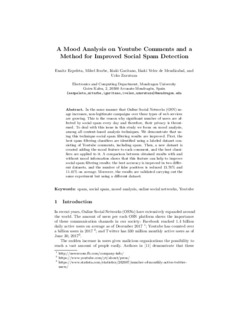| dc.contributor.author | Ezpeleta, Enaitz | |
| dc.contributor.author | Iturbe, Mikel | |
| dc.contributor.author | Garitano, Iñaki | |
| dc.contributor.author | Velez de Mendizabal, Iñaki | |
| dc.contributor.author | Zurutuza, Urko | |
| dc.date.accessioned | 2019-04-03T10:44:28Z | |
| dc.date.available | 2019-04-03T10:44:28Z | |
| dc.date.issued | 2018 | |
| dc.identifier.isbn | 978-3-319-92639-1 online | en |
| dc.identifier.isbn | 978-3-319-92638-4 print | en |
| dc.identifier.other | https://katalogoa.mondragon.edu/janium-bin/janium_login_opac.pl?find&ficha_no=148654 | en |
| dc.identifier.uri | https://hdl.handle.net/20.500.11984/1178 | |
| dc.description.abstract | In the same manner that Online Social Networks (OSN) usage increases, non-legitimate campaigns over these types of web services are growing. This is the reason why signi cant number of users are affected by social spam every day and therefore, their privacy is threatened. To deal with this issue in this study we focus on mood analysis, among all content-based analysis techniques. We demonstrate that using this technique social spam filtering results are improved. First, the best spam filtering classifiers are identified using a labeled dataset consisting of Youtube comments, including spam. Then, a new dataset is created adding the mood feature to each comment, and the best classifiers are applied to it. A comparison between obtained results with and without mood information shows that this feature can help to improve social spam filtering results: the best accuracy is improved in two different datasets, and the number of false positives is reduced 13.76% and 11.41% on average. Moreover, the results are validated carrying out the same experiment but using a different dataset. | en |
| dc.description.sponsorship | Gobierno de España | es |
| dc.description.sponsorship | Gobierno de España | es |
| dc.description.sponsorship | Gobierno Vasco | es |
| dc.language.iso | eng | en |
| dc.publisher | Springer | en |
| dc.rights | © Springer International Publishing AG, part of Springer Nature 2018. This is a post-peer-review, pre-copyedit version of an article published in Hybrid Artificial Intelligent Systems. HAIS 2018. Lecture Notes in Computer Science, vol 10870. The final authenticated version is available online at: https://doi.org/10.1007/978-3-319-92639-1_43 | en |
| dc.subject | spam | en |
| dc.subject | social spam | en |
| dc.subject | mood analysis | en |
| dc.subject | online social networks | en |
| dc.subject | Youtube | en |
| dc.title | A Mood Analysis on Youtube Comments and a Method for Improved Social Spam Detection | en |
| dcterms.accessRights | http://purl.org/coar/access_right/c_f1cf | en |
| dcterms.source | Hybrid Artificial Intelligent Systems (HAIS 2018). Pp. 514-525. Lecture Notes in Computer Science | en |
| local.description.peerreviewed | true | en |
| local.identifier.doi | https://doi.org/10.1007/978-3-319-92639-1_43 | en |
| local.relation.projectID | GE/Programa Estatal de Investigacion, Desarrollo e Innovación orientada a los retos de la sociedad en el marco del Plan Estatal de Investigación Científica y Técnica y de Innovación 2013-2016, convocatoria del 2017/TIN2017-84658-C2-2-R/Integración de Conocimiento Semántico para el Filtrado de Spam basado en Contenido/SKI4SPAM | en |
| local.relation.projectID | GE/Ayudas para la Excelencia de los Equipos de Investigación avanzada en ciberseguridad/INCIBEC-2015-02495/ES// | en |
| local.relation.projectID | GV/Ikertalde Convocatoria 2016-2021/IT886-16/CAPV/Sistemas Inteligentes para Sistemas Industriales/ | en |
| local.embargo.enddate | 2019-06-08 | |
| local.source.details | Vol.10870. Springer, | eu_ES |
| oaire.format.mimetype | application/pdf | |
| oaire.file | $DSPACE\assetstore | |
| oaire.resourceType | http://purl.org/coar/resource_type/c_c94f | en |
| oaire.version | http://purl.org/coar/version/c_ab4af688f83e57aa | en |







